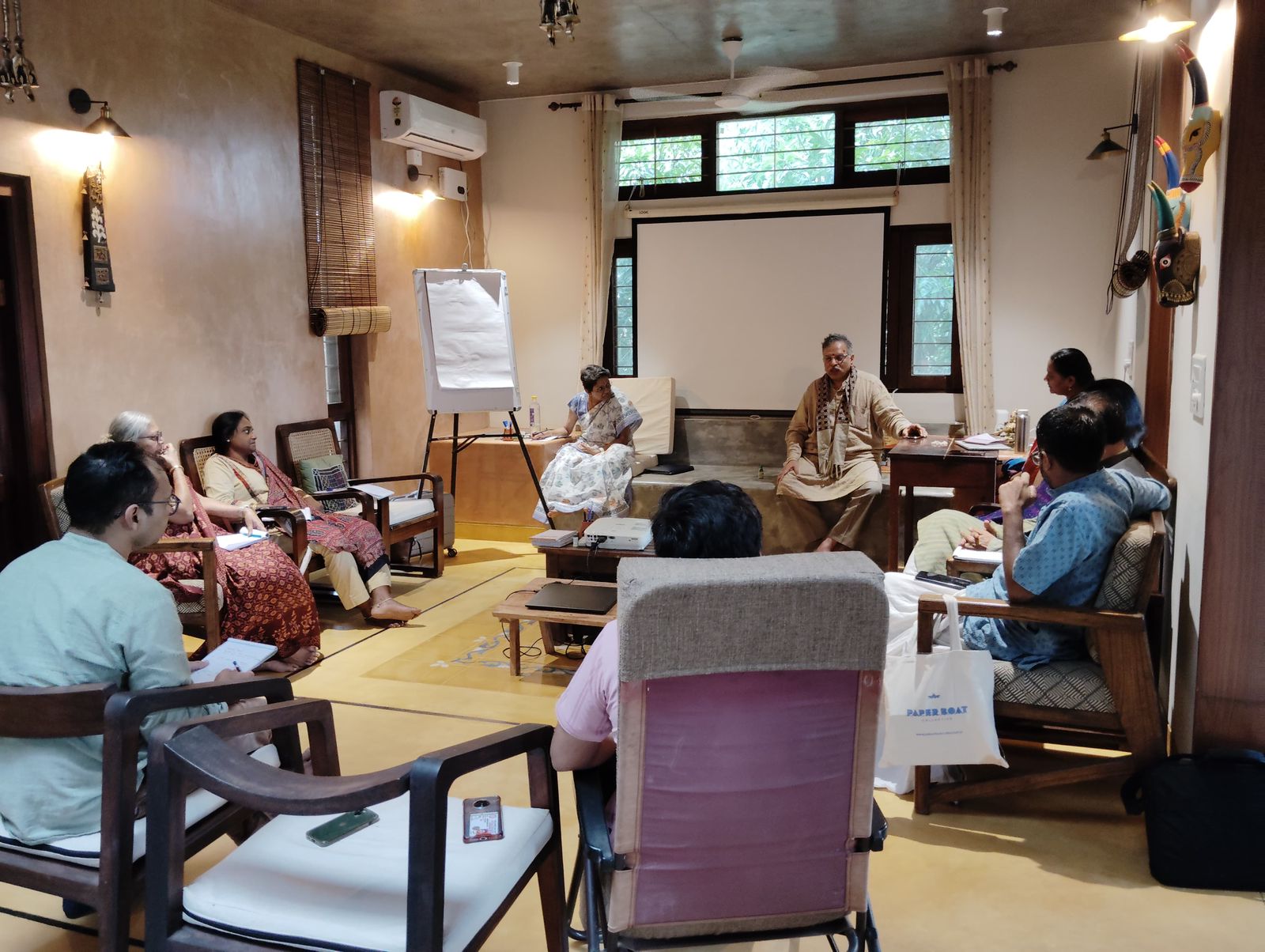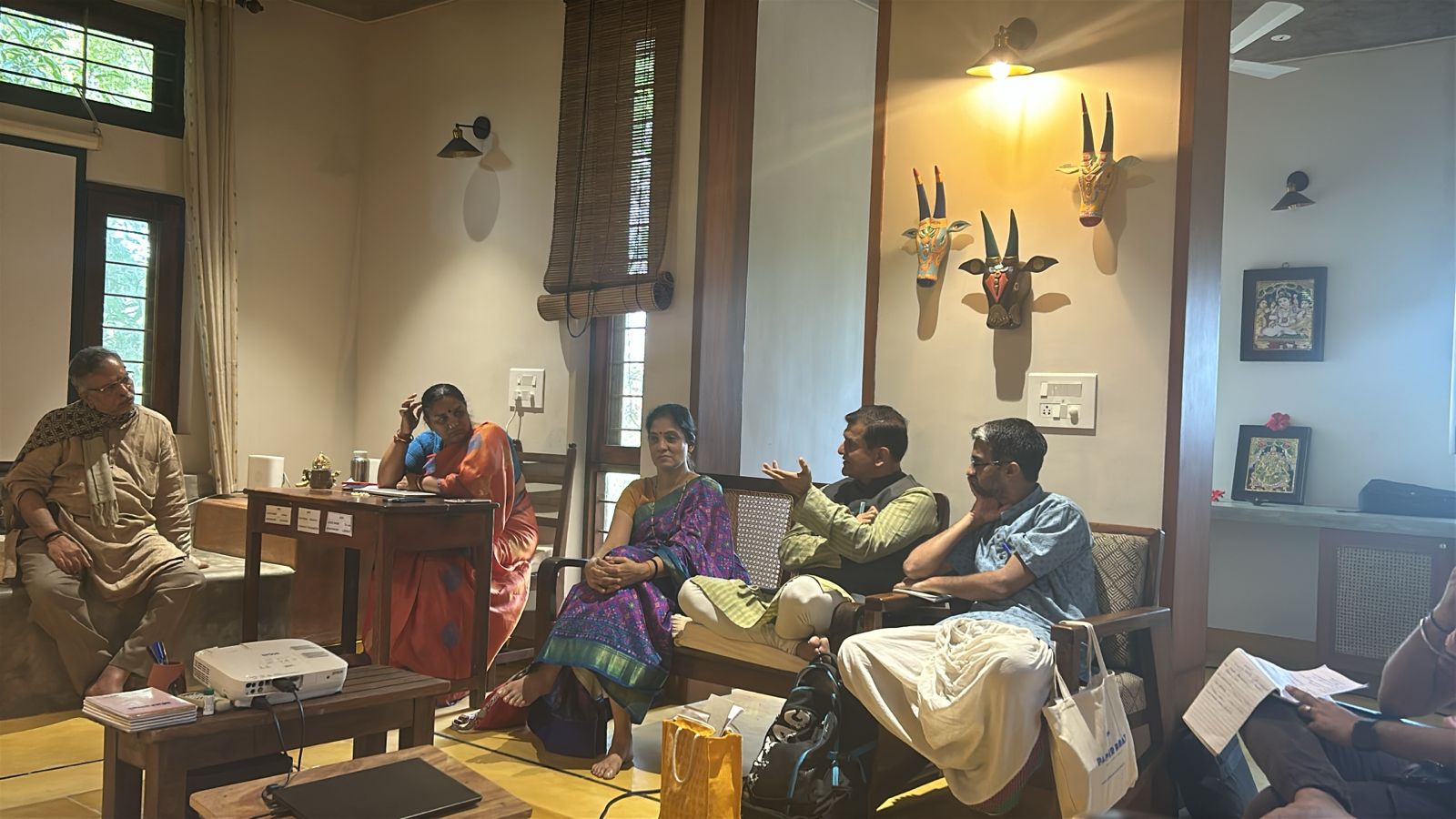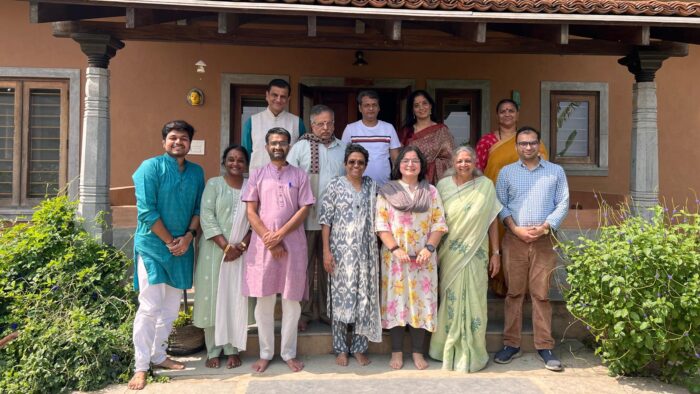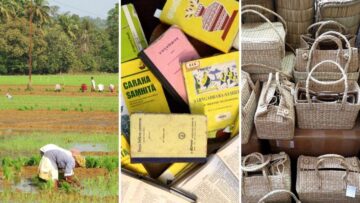INDICA is pleased to share the conclusion of the 12th INDICA IKS Meta-Retreat on “Transformative Pedagogy – Exploring Hindu Learning Traditions“ from 27-29 Dec 2024, with Dr. Nagaraj Paturi garu as the SME Anchor and Author Smt. Sahana Singh as the SME Co-Anchor. The other cohort members were
- Dr. Arundhati Sundar – Chinmaya Vishwavidyalaya
- Dr. Ankur Kakkar – Indus University
- Dr. Srinidhi V – Co-Founder Poorna Pramati and Independent Scholar
- Shri. Muneet Dhiman – Founder and Kulapati, Vidyakshetra
- Ma. Smriti Adinarayan – Co-Founder, Anaadi Foundation
- Dr. Nithya Sundaram – Founder Learning Prakriya
- Dr. Arbind Kumar Jha – School of Education, Indira Gandhi National Open University
- Dr. Yamuna Harshavardhana – State Incharge, Institutional Project, Bharatiya Shiksha Mandal
- Dimple Kaul, Director – Academic Programs, INDICA & the Program Anchor of the MetaRetreat
This MetaRetreat was envisioned as a collaborative platform for a select group of participants to deliberate on the evolution of pedagogy with respect to Indian Knowledge Systems (IKS). The objectives were to examine past and present efforts, identify challenges, and outline actionable steps to address them. The MetaRetreat discussions were designed to foster feedback and inputs from the group, enabling the identification of short, medium, and long-term goals. The discussion led to specific actions, initiatives and programs. A concrete plan of action, with clearly defined sub-groups and/or individuals, will be established to work towards these specific goals.

The Context
The MetaRetreat sought to reflect on India’s rich educational heritage and its potential to address contemporary learning challenges. It aimed to revisit time-tested methods of teaching, curriculum design, and interdisciplinary learning deeply rooted in India’s intellectual traditions, and to examine whether the collective wisdom within Hindu thought could guide the creation of integrated, holistic learning environments. Participants were encouraged to explore traditional pedagogical methods, oral traditions, the guru–shishya relationship, and the spiritual dimensions of learning, with the intention of adapting these into present-day educational frameworks.
Discussions were designed to identify design principles and parameters for curriculum development that reflect India’s diverse intellectual heritage, integrate indigenous knowledge systems with holistic approaches to learning, and foster a decolonized perspective on education. The retreat also intended to deliberate on ways to synthesise these traditional insights with modern pedagogical innovations, thereby creating approaches that remain relevant in a rapidly changing world.
Through dialogue, the MetaRetreat sought to explore possibilities for reshaping educational policies and practices by drawing on the knowledge of India’s past. The ultimate objective was to envision educational systems that promote holistic development, intellectual growth, and cultural rootedness, aligning ancient wisdom with contemporary needs for a sustainable and enriching learning future.

The Discussion
The following initiatives were considered, explored, and identified for future action.
- The MetaRetreat deliberations considered policy-level recommendations aimed at strengthening higher education through improved teacher training. Discussions focused on equipping faculty in Higher Education Institutions with relevant pedagogical tools and frameworks, supported by structured training programs. A significant aspect was the envisioning of a teacher education curriculum for B.Ed. and M.Ed. programs rooted in Indian Knowledge Systems (IKS), with an optimal blend of Classical Knowledge Systems and modern application. Fieldwork components in traditional learning environments and the mainstreaming of Indic vocabulary, epistemologies, and frameworks were also explored.
- Parenting education, or Kutumba Shiksha, emerged as another key area of focus, with discussions on designing an Indic framework enriched by documented successful practices. The potential to disseminate such modules through online learning platforms was explored to enable wider reach. In parallel, restructuring elementary education was examined, considering innovative approaches while applying cautionary insights to ensure balance and holistic development.
- Promoting creativity and critical thinking through IKS-based design thinking models were identified as a future priority. Proposals included developing a monograph on pedagogical themes, advancing a book on the Bharatiya theory of knowledge, and creating a scholarly resource tracing pedagogical practices referenced in ancient Indian texts. These initiatives aim to build robust academic and practical foundations for education aligned with Indic perspectives.
- Finally, the retreat explored pathways for ongoing research contributions, such as papers on the merits of Sutra-based memorization, with potential publication in both internal and external academic platforms. Engagement with local private schools was also considered, particularly initiatives aligned with the National Education Policy, including vocational credits and Lokavidya-based learning, to bridge traditional wisdom with contemporary educational needs.

INDICA MetaRetreats
The INDICA Meta-Retreat is an immersive program with the theme of Acharya-Ambience-Attitude. It is led by an Anchor, with the ambience of our ancient Gurukula-s, where all members of the cohort come together in an Upanishadic setup with an attitude to seek and learn from each other. This fosters an environment to imagine a future for a specific discipline they are passionate about and which is crucial for the renaissance of our civilization. Through this retreat, we seek to summarize the past, analyse the present, and synthesize a future in that discipline for Dharma.






